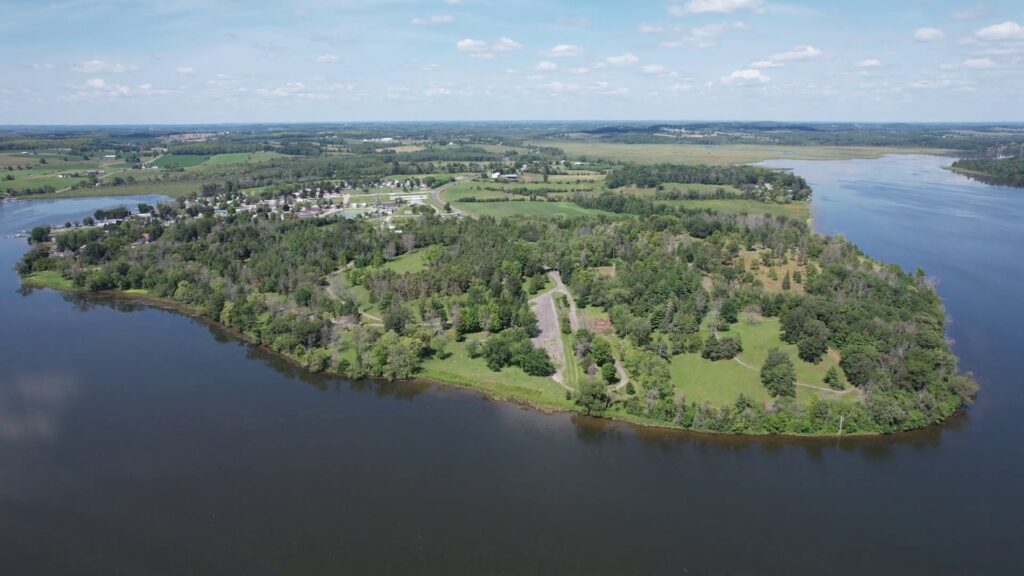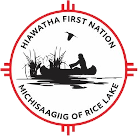Hiawatha First Nation Unveils Site Upgrades at Serpent Mounds Park
Hiawatha First Nation — March 2024 — Hiawatha First Nation is excited to announce a series of enhancements at Serpent Mounds Park. Situated amongst the breathtaking landscapes overlooking Rice Lake, Serpent Mounds Park has long been celebrated for its rich cultural heritage and stunning natural beauty.
Thanks to a $100,000 non-repayable contribution from the Government of Canada through the Federal Economic Development Agency for Southern Ontario (FedDev Ontario), Hiawatha First Nation is one step closer to its goal of redeveloping and reopening Serpent Mounds Park.
The funding was used to support facility improvements including the removal of old buildings and septic systems, the installation of a new entry gate and upgrades to parking areas and road ways.
Hiawatha First Nation is planning to re-open Serpent Mounds Park as an Indigenous Cultural Heritage tourism and education site. The goal is to protect the sacred burial mounds, increase respect for Indigenous culture, burial grounds and sacred sites, and support Hiawatha First Nation’s community economic development.
The re-opening is planned in phases, with Hiawatha currently in the pre-operational phase that includes planning, financing and site work. The next step will be the completion of an archeological assessment that is vital to help preserve the Park’s historical integrity.
“We were delighted to receive the funding and support from FedDev Ontario,” said Laurie Carr, Chief of Hiawatha First Nation. “This funding supports much-needed site improvements at Serpent Mounds Park and helps bring Hiawatha one step closer to achieving our long-term goal of providing visitors with meaningful experiences that not only showcase the beauty of our natural surroundings but also highlight the rich cultural heritage of this land.”


National Historic Site of Canada
Serpent Mounds Park is owned by Hiawatha First Nation and located approximately 10 minutes east of the community of Hiawatha on the north shore of Rice Lake. Serpent Mounds Park is a very special place, and for many years was leased to the government and operated as a Provincial Park. In 1995 Hiawatha did not renew their leasing agreement with the Province and began to privately operate the park, which featured over 152 campsites, cottage rental, eco-cabin rentals, canoe and kayak rentals, day-use areas, 3 sandy beaches, picnic shelter area and boat launches. It also operated a Cultural Centre which promoted the natural beauty and history of the Park, and provided tours of the sacred Serpent Mound site.
Unfortunately in 2009, due to the decline in the tourism market and failing infrastructure, the Park was forced to close to the public as it could no longer keep pace with the changing needs of consumers.
Serpent Mounds Park is also home to the sacred Serpent Mounds, an Aboriginal historic site with evidence of occupation and use spanning more than 2000 years. It is here that Archeologists discovered evidence that ancient Native people gathered in large settlements around the lake to camp, hunt, fish, collect freshwater mussels and harvest the abundant wild rice cops which once occupied Rice Lake. Evidence found throughout the site, identified occupation dating back to 58 B.C., and the assemblage of artifacts provides extensive information on the habitation, rituals and culture of this ancient site and represents the most complete picture of Point Peninsula life. The site clearly illustrates the long-term cultural processes and represents cultural records of early habitation closely integrated with the natural environment.
It is also here, on a high point of land overlooking Rice Lake that the nine earthen burial mounds which enclose the graves of the Point Peninsula Native people can be found. The largest mound, shaped like a serpent, is approximately 60 meters long and 8 meters wide, and the only one of its kind in Canada. It is from this mound that the site and Park derives its name. Surrounding the serpentine mound are eight oval or round mounds, often described as the “serpent’s eggs”. Aboriginal people who lived in nearby settlements built these mounds to bury their dead and revere their ancestors. This sacred place continues to hold deep cultural, historical and spiritual meaning to the Mississaugii people of this area and to First Nation people across North America.
It is for these reasons, on June 14, 2002, the Serpent Mounds were officially designed a National Historic Site of Canada by the Historic Sites and Monuments Board of Canada.
Today, the Park remains closed as the community investigates new opportunities and potential partnerships to revitalize the Park, so it can once again become a popular tourism destination property.
Hiawatha First Nation remain the proud stewards and caretakers of the sacred mound site, so it can be protected and continue to be shared with all of mankind for generations to come.
